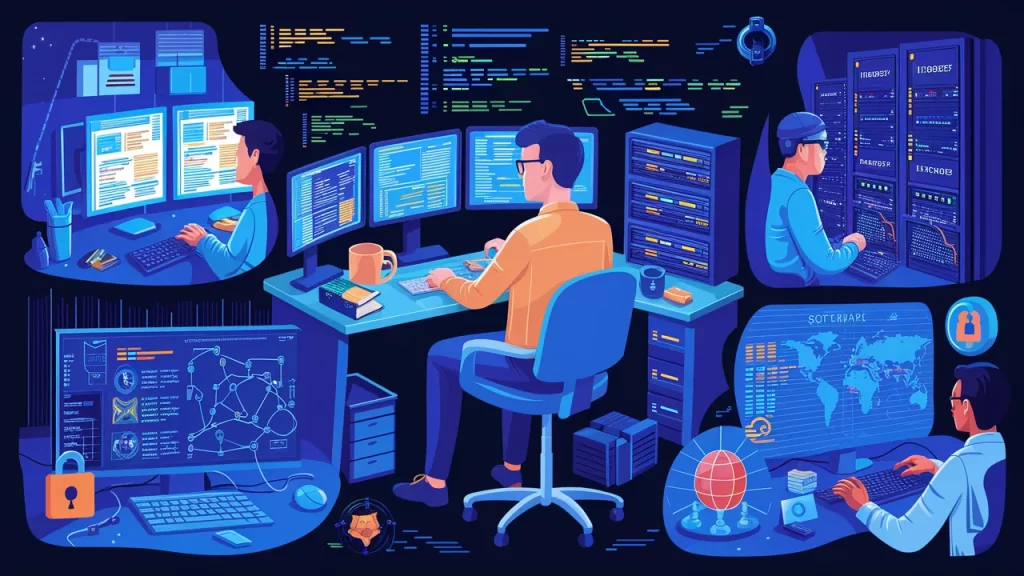3. IT and Technical Jobs
The IT and technical sectors offer a wide range of remote job opportunities, allowing professionals to leverage their skills in software development, network management, cybersecurity, and data analysis. These roles are critical for businesses to maintain robust technological infrastructure and data integrity.
Software Developer
Role Description: Software developers design, build, and maintain software applications and systems. They work with various programming languages and development tools to create software that meets user needs and business requirements.
Key Responsibilities:
- Writing clean, efficient, and maintainable code.
- Collaborating with cross-functional teams to define and implement software requirements.
- Testing and debugging software to ensure functionality and performance.
- Maintaining and improving existing software.
- Keeping up to date with the latest industry trends and technologies.
Skills Required:
- Proficiency in programming languages such as Java, Python, C++, or JavaScript.
- Strong problem-solving and analytical skills.
- Experience with software development methodologies like Agile or Scrum.
- Knowledge of version control systems such as Git.
- Ability to work independently and manage projects effectively.
Network Engineer
Role Description: Network engineers design, implement, and manage computer networks, ensuring they operate smoothly and securely. They work on local area networks (LANs), wide area networks (WANs), and other data communication systems.
Key Responsibilities:
- Designing and configuring network hardware and software.
- Monitoring network performance and troubleshooting issues.
- Ensuring network security and implementing measures to protect against cyber threats.
- Upgrading network infrastructure to support business needs.
- Collaborating with IT teams to integrate new technologies.
Skills Required:
- In-depth knowledge of network protocols and technologies (e.g., TCP/IP, DNS, VPN).
- Proficiency in configuring network devices such as routers, switches, and firewalls.
- Strong problem-solving and diagnostic skills.
- Experience with network monitoring and management tools.
- Understanding of network security principles and best practices.
Cybersecurity Analyst
Role Description: Cybersecurity analysts protect an organization’s computer systems and networks from cyber threats. They identify vulnerabilities, monitor for security breaches, and respond to incidents to mitigate risks.
Key Responsibilities:
- Conducting vulnerability assessments and penetration testing.
- Monitoring network traffic for unusual activity and potential threats.
- Investigating security breaches and coordinating incident response.
- Developing and implementing security policies and procedures.
- Educating employees about cybersecurity best practices.
Skills Required:
- Strong understanding of cybersecurity principles and practices.
- Proficiency with security tools such as firewalls, intrusion detection systems, and antivirus software.
- Analytical and critical thinking skills.
- Knowledge of regulatory standards and compliance requirements (e.g., GDPR, HIPAA).
- Ability to stay updated on the latest cybersecurity threats and trends.
Data Scientist
Role Description: Data scientists analyze large sets of data to extract valuable insights that can inform business decisions. They use statistical methods, machine learning algorithms, and data visualization techniques to interpret complex data.
Key Responsibilities:
- Collecting, cleaning, and preprocessing data from various sources.
- Applying statistical and machine learning techniques to analyze data.
- Creating data models and algorithms to predict future trends.
- Visualizing data and presenting findings to stakeholders.
- Collaborating with other teams to integrate data-driven insights into business strategies.
Skills Required:
- Strong proficiency in programming languages such as Python or R.
- Experience with data analysis and visualization tools (e.g., SQL, Tableau, Power BI).
- Knowledge of machine learning algorithms and statistical methods.
- Strong analytical and problem-solving skills.
- Ability to communicate complex findings to non-technical stakeholders.
IT and technical jobs are essential for maintaining and advancing technological infrastructure in any organization. These roles offer the opportunity to work on challenging projects, continuously learn new skills, and contribute significantly to the success of a business. Working from home in these positions provides additional flexibility and can lead to a satisfying and well-rounded career.
